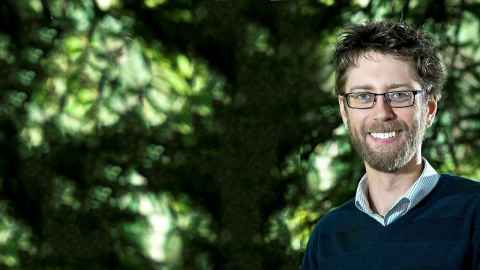Modern political differences linked to human evolution
15 April 2020
What determines our views on taxation, welfare, crime, healthcare, military spending and climate change?

A new paper from the University of Auckland published in Nature Human Behaviour argues that political ideology is best described by two ideological dimensions with deep roots in human evolution.
Although political attitudes are widely seen as falling along a single ideological spectrum from left (liberal) to right (conservative), research supports the existence of two dimensions of political ideology.
The first dimension (sometimes called economic conservatism) organises attitudes regarding taxation, welfare, and public healthcare, while the second dimension (sometimes called social conservatism) reflects views on traditional family values, criminal justice, and militarisation.
Professor Quentin Atkinson and a team from the University of Auckland argue that the two dimensions of political ideology are the product of two key tensions that characterise human social groups: a tension between competition and cooperation, and a tension between group social control and individual autonomy.
Taking an evolutionary approach, the authors suggest that these key tensions arose after the divergence of humans from other great apes, as human social groups became both more egalitarian and more conformist.
“While chimpanzees use dominance hierarchies to organise their social groups, humans are much more egalitarian, collaborative, and cooperative,” says Scott Claessens, first author and PhD student at the University of Auckland.
“Humans are also unique in what we might call their groupishness; unlike other great apes, we care deeply about social norms and hate it when other group members break the rules, as evidenced by the current Covid-19 lockdown.”

Scientists have hypothesised that these shifts in human social evolution occurred during the Pleistocene (or Ice Age, thought to have lasted from 2.6 million to 11,700 years ago) when scarcity of resources, threats from other groups, and ecological pressures forced humans to work together to survive.
“Human social groups became absolutely essential for survival, encouraging shifts towards more equal sharing of resources and a sense of shared group identity, although tensions always existed within groups.”
In ancestral human groups, these tensions reflected different attitudes regarding sharing of resources and strict adherence to the local cultural norms. In modern human groups, the authors argue, these same tensions manifest in different attitudes regarding, for example, taxation and criminal justice.
Professor Quentin Atkinson says that this new framework offers a fresh perspective on modern day political differences.
“It has always fascinated me how even smart people can disagree so fundamentally about the way our society is organised,” says Professor Atkinson.
“Our framework offers an explanation for this in terms of age-old tensions between hierarchy and cooperation, and between conformity and individualism.”
The researchers say their framework provides a sturdier theoretical foundation for political science than has so far been developed.
“A better understanding of the motives underlying our political differences may help us unite to tackle some of the great challenges of the 21st century, like climate change, protection from economic shocks and, most recently, responding to global pandemics,” Professor Atkinson says.
Media contact
Anne Beston | Media adviser
DDI 09 923 3258
Mob 021 970 089
Email a.beston@auckland.ac.nz